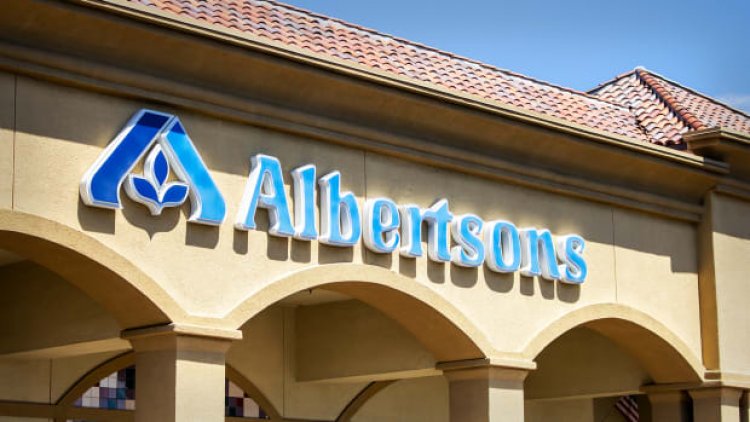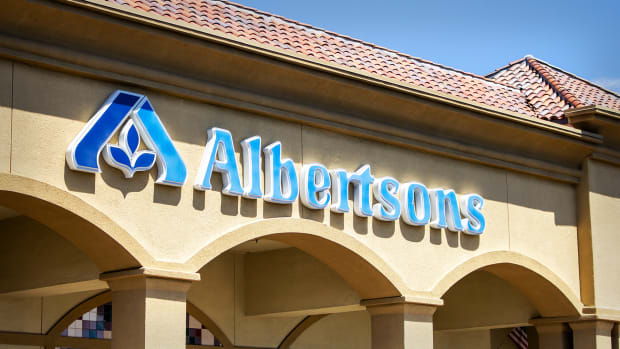Kroger Vows Court Fight to Make Albertson's Merger Happen
A merger of Kroger and Albertson's would create a company with 5,000 stores in 48 states.

The proposed merger between grocers Kroger (KR) - Get Free Report and Albertson’s (ACI) - Get Free Report is being challenged. After the merger was first revealed, it became clear that some people didn’t understand the purpose of the merger. The merger would result in a company owning a combined total of about 5,000 grocery stores across 48 states.
The merger would also result in a combined 52 manufacturing plants, nearly 4,000 pharmacies, and over 2,000 fuel centers. The merger would create a market share of about 18 percent for the new Kroger and Albertson’s entity.
In an attempt to squash the fears surrounding the merger, Kroger CEO Rodney McMullen and Albertson’s CEO Vivek Sankaran issued a joint statement to the Cincinnati Enquirer. They addressed impacts on consumers and employees, such as Kroger vowing to close zero of its stores, employees losing their jobs and groceries becoming more expensive. A statement that no frontline workers would be laid off is is not inclusive of all employees. The CEO pair stated the company would offer lower prices and more choices that customers need and want after the merger.
The fears of the merger should come from other larger businesses, as this merger would put the grocer on a more even playing field with Walmart (WMT) - Get Free Report, Amazon (AMZN) - Get Free Report, Costco (COST) - Get Free Report, and Target (TGT) - Get Free Report. Shutterstock
Kroger and Albertson’s Commits to Fight
The commitment to make the merger happen is either a promise or a threat, depending on who you are. Both CEOs have committed that they will work to make the merger happen, despite facing litigation from the American Antitrust Institute. The merger raised many questions about how it would impact the companies and its employees. The combination of the two chains would create another competitor at the same size as Walmart, which also has roughly 5,000 stores.
Walmart might see the biggest challenge, since the merger would help the grocery store chains reach a similar consumer in the same fashion with brick-and-mortar locations. Amazon, while being able to reach much of the same market, doesn’t quite have the same target audience as a local grocer.
The United Food and Commercial Workers International Union UFCW released a statement.
“At our 9th Regular Convention, hundreds of UFCW delegates representing our entire union from around the country came together to unanimously declare that mergers pose a serious threat to the livelihoods of our members, and we must act to confront them," the statement said.
“Given the lack of transparency, and the impact a merger between two of the largest supermarket companies could have on essential workers – and the communities and customers they serve – the UFCW stands united in its opposition to the proposed Kroger and Albertsons merger, according to the Supermarket News.
"The only parties who would benefit if this merger is not completed are large, non-unionized competitors such as Walmart and Amazon,” Kroger said in an email to Supermarket News.
What Kroger Isn't Talking About
Kroger and Albertson's are ready to pursue legal action to make the merger happen. Which could mean a long-drawn-out battle. All the “promises” being made regarding the so-called myths about the merger, are not legally binding. The statements made by the CEOs give hope that the merger would benefit its consumers and there would be another retail giant in the grocer market alongside Walmart and the other competitors.
The idea that the consumer would benefit from having lower costs at the grocery check-out, isn’t something that the grocery chain can promise and deliver on. Those are really hopes, not promises.
The promises that stores wouldn’t close, and front-line workers won’t lose their jobs, again isn’t a promise that can be kept. The idea that front-line workers, won’t be affected may be in line for the current labor crisis, but cannot be guaranteed over a long period of time.
The threats are felt by the other smaller grocery stores that would not be able to compete with having another large retail giant in their grocery market. However, increasing the level of competitiveness in the large retail grocery market, could lower prices among those giants to benefit the consumer, but not the smaller grocery stores.
What's Your Reaction?



























































